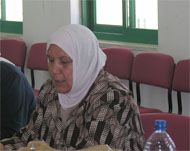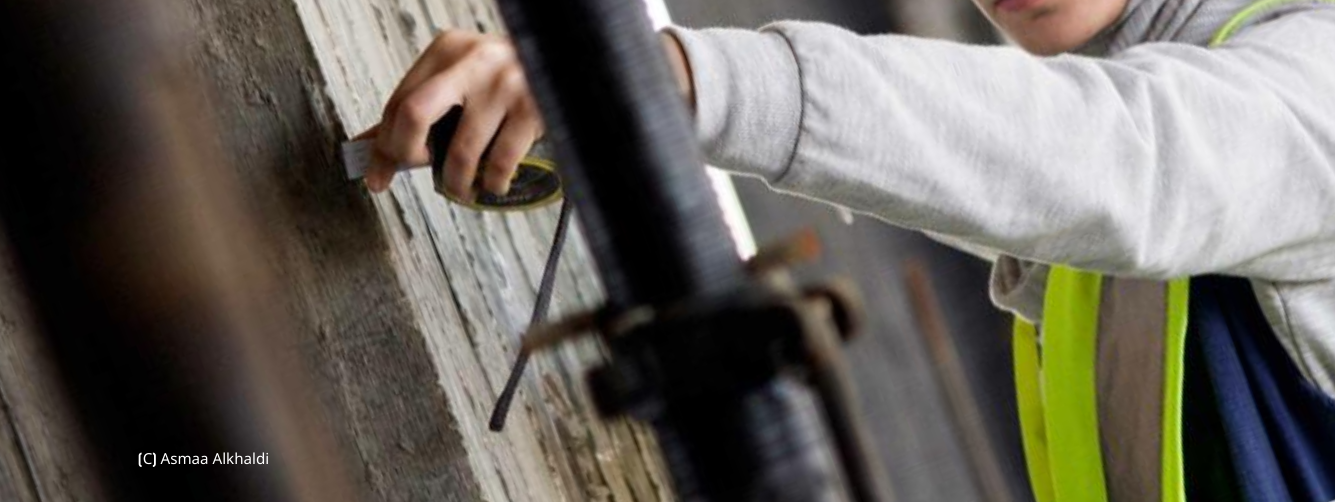
Siham Abu Asabeh: "MIFTAH stayed with us every step of the way"
Siham Abu Asabeh is a municipal council member in Halhoul and is a participant in the "Gender Responsive Budget" project, conducted by MIFTAH.
Please tell us a bit about yourself
I am from the Hebron-area town of Halhoul. I am 50 years old and worked for many years in the education sector. Presently I am retired but am a volunteer in the education field and in field of social services as well as a member in the Family Planning Center. I am also a member of the Halhoul municipal council.
How did you first get introduced to MIFTAH and begin working with the organization?
I heard about MIFTAH from their activities and workshops, which I was invited to by MIFTAH's Hebron coordinator Maysoon Qawasmi. I was a Halhoul municipal council member from 1994 to 2004. In the first stage, there were no "lists" but I still succeeded in the free elections system. MIFTAH was the first organization that took us under its wing and continued with us uninterruptedly through rehabilitation, training and empowerment programs. Some of these included workshops on centralization/decentralization, dealing with the media, strategic planning, time management and gender and conflict management. There were also workshops on human resource management, project management, communication skills and others. MIFTAH did not hesitate to offer support and consultation unlike other organizations, which would discontinue working with us half way.
What kind of work do you do in the municipality and how did the gender-sensitive budget project affect your work in particular?
I like to consider myself a very active member of the municipality. Hence, we all try to study the needs of the townspeople and work to provide for them as much as we can. I try to take part in all the outside activities of the municipality as well. As for the GRB project, I have been a part of it since the beginning. We organized a one-month workshop on gender in Halhoul and the results of the research we conducted were presented to the community along with a needs assessment presentation for the town. Our training helped us to remain in contact with the men and women so we could better serve the townspeople from cultural and social aspects. I have personally maintained contact with the women so I can constantly understand their needs.
Did you notice any difference among the target groups before and after the project was implemented?
Yes, there was a huge difference. At the beginning, the men were not receptive to the women's views. They were not willing to listen to their ideas and opinions seriously. But after the gender workshops, the meetings became much more lively between the two sexes, especially from the men's side. I think they benefited greatly from these gender workshops. Even our study is being used as a reference for understating the concerns of the town and for formulating our strategies and needs assessments.
How would you assess the people's interaction with the project? Can we say the project will have its intended results in the short and long-terms?
I think the response from the people was very positive. There was a wide variety of people who participated in the courses including school principals, intellectuals and employees along with about 28 organizations. There were also female university students. As for the outcomes, while I think they are positive and have already come a long way, there is still a ways to go. The project's impact has just begun to show among the people so we need more intensive and accumulative work.
Do you think your participation in MIFTAH's workshops has helped you hone your others skills?
Yes, for sure. My participation in MIFTAH's activities has broadened my connections. I used to work in the education field and I have contact with a wide network of people because of my volunteer and social work, and this helped me to merge better with local council members and our local community. MIFTAH's courses empowered us in every sense of the word and made us more able to interact with people and society. It also won us the confidence and love of the people.
Did your work with MIFTAH open new doors of opportunity for you career-wise? And would you participate in future projects with MIFTAH if possible?
It has. While we were preparing for the local elections, I became a reference point for a number of men and women who wanted to run. They would ask me about my experience and would ask for advice and guidance given my experience with dealing with various organizations and the skills I have acquired. Even though the local elections were postponed, this trust and confidence that I gained will no doubt encourage me to remain connected with MIFTAH in any future projects that could benefit us all.
What would you say are the accomplishments you achieved through this project for your community?
Because of the training I received, my presence in the town I believe had a huge impact on improving the quality of work in Halhoul and in gender sensitive issues in particular. In our town hall meetings, we always focus on meeting the needs of the townspeople and presenting projects that would benefit both men and women. For example, we built a park. I am always careful to carry out projects that serve gender issues, the infrastructure and every social sector such as the disabled and students. For example, we provided additional classrooms and cancelled afternoon classes in the towns' schools.
How would you assess MIFTAH's standing among other civil society institutions in your capacity as a women's activist in the field?
In my opinion – and I am not just trying to flatter you – MIFTAH is the best organization in the field because it keeps up with us and truly cares. It did not leave our sides at any stage but worked side by side with us straight through. In that sense, we established a strong relationship with MIFTAH and we thank the organization and its donors for this. I hope it will continue with its work in serving our society.
What would you suggest as ways of supporting the Gender-Responsive Budge project, now that you have worked with MIFTAH in this field?
MIFTAH covered very sensitive subjects that affect society as a whole, especially the subject of gender. I suggest that the circle of targeted municipalities is broadened and more activities involved so a larger number of people can benefit, including in the more remote areas of Palestine.






